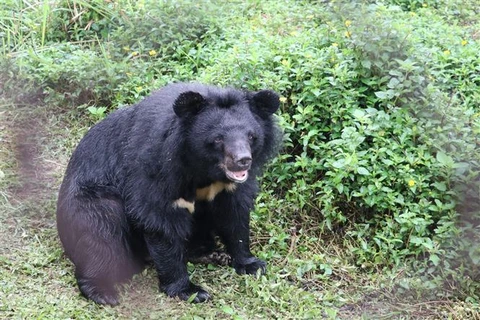Hanoi (VNA) – A short film entitled “Safari” by Vietnamese students Nguyen Hoang Phuc Nghi and Nguyen Cat Vu from RMIT University has won the Award of Excellence in the Animation category at the Nature Without Borders International Film Festival (NWBIFF) in the US.
This award was given to "entries of exceptional artistic and technical merit".
Nghi and Vu originally developed the film as part of the Pixilation Animation course offered by the Digital Media programme at RMIT Vietnam.
Using a mix of paper cutouts, shadows, and pixilation animation techniques, the project was challenging and time-consuming, requiring careful attention to details.
Safari is a stop-motion animated short film that takes viewers on a journey to explore and protect natural habitats.
The journey is told by a traveler who witnesses a landscape being ravaged by humans through deforestation and hunting. By showing the destruction of plants and animals to meet human needs, the film raises awareness of the urgency of protecting the environment.
Talking about the film, Nghi said that most of the objects used in this project were created using the paper cut-out technique. They chose this technique because it is emblematic of the destruction of nature caused by human activities.
To emphasise the destruction, they added texture to the paper. Cut paper was used to create shadows, which are the main objects in this project. Shadows usually have a negative connotation, and in this case, shadows were used to highlight the negative impact of inhumane activities on the environment, Nghi added.
Undertaking the film project also helps students gain experience and learn lessons, especially when they face arising problems. Vu said that during the film making process, he and Nghi learned many new things about how to exploit light, shading, and colour towards their goals in the film.
 “Safari” wins the Award of Excellence in the Animation category at the Nature Without Borders International Film Festival (NWBIFF) in the US. (Photo: VietnamPlus)
“Safari” wins the Award of Excellence in the Animation category at the Nature Without Borders International Film Festival (NWBIFF) in the US. (Photo: VietnamPlus) Vu said that they had to shoot in the dark for some of the special effects, noting that they encountered many problems, such as lack of time, poor quality of the sequences (which required reshoots), and balancing with their heavy workload.
Lecturer Ricardo Arce-López, the project's mentor, said the result is an exceptional artistic and technical achievement that serves as a reminder of the effects of deforestation and wildlife hunting. He commented that Safari shows the power of creativity in addressing environmental issues.
Appreciating the student's project, Ricardo Arce-López said that the short film shows the power of creativity in solving environmental problems. The film is not only valuable in terms of art, but at the same time is a reminder of the effects of deforestation and wildlife hunting, especially when the whole world is looking forward to Earth Day on April 22.
He said that the film was submitted to other international film festivals in the hope of spreading its powerful message./.


























